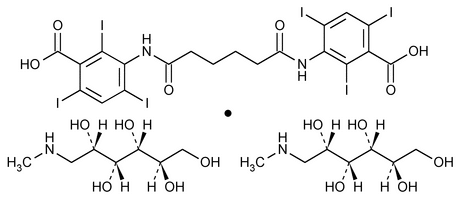Iodipamide Meglumine Injection
Benzoic acid, 3,3¢-[(1,6-dioxo-1,6-hexanediyl)diimino]bis[2,4,6-triiodo-, compd. with 1-deoxy-1-(methylamino)-d-glucitol(1:2).
1-Deoxy-1-(methylamino)-d-glucitol 3,3¢-(adipoyldiimino)bis[2,4,6-triiodobenzoate] (2:1) (salt)
» Iodipamide Meglumine Injection is a sterile solution of Iodipamide in Water for Injection, prepared with the aid of Meglumine. It contains not less than 95.0 percent and not more than 105.0 percent of the labeled amount of iodipamide meglumine (C20H14I6N2O6·2C7H17NO5). It may contain small amounts of suitable buffers and of Edetate Calcium Disodium or Edetate Disodium as a stabilizer. Iodipamide Meglumine Injection intended for intravascular use contains no antimicrobial agents.
Packaging and storage—
Preserve in single-dose containers, preferably of Type I or Type III glass, protected from light.
Labeling—
Label containers of Injection intended for intravascular injection to direct the user to discard any unused portion remaining in the container. Label containers of Injection intended for other than intravascular injection to show that the contents are not intended for intravascular injection.
USP Reference standards  11
11 —
—
USP Endotoxin RS
Identification—
A:
Dilute a volume of the Injection, if necessary, with a 0.8 in 1000 solution of sodium hydroxide in methanol to obtain a test solution having a concentration of 1 mg per mL. The test solution responds to the Thin-layer Chromatographic Identification Test  201
201 , the Standard solution being prepared at a concentration of 1 mg of USP Iodipamide RS per mL in a 0.8 in 1000 solution of sodium hydroxide in methanol, the solvent mixture being a mixture of chloroform, methanol, and ammonium hydroxide (20:10:2), and short-wavelength UV light being used to locate the spots.
, the Standard solution being prepared at a concentration of 1 mg of USP Iodipamide RS per mL in a 0.8 in 1000 solution of sodium hydroxide in methanol, the solvent mixture being a mixture of chloroform, methanol, and ammonium hydroxide (20:10:2), and short-wavelength UV light being used to locate the spots.
B:
Evaporate a volume of Injection, equivalent to about 500 mg of iodipamide, to dryness, and heat the residue so obtained in a suitable crucible: violet vapors are evolved.
Bacterial endotoxins  85
85 —
It contains not more than 3.6 USP Endotoxin Units per mL.
—
It contains not more than 3.6 USP Endotoxin Units per mL.
pH  791
791 :
between 6.5 and 7.7.
:
between 6.5 and 7.7.
Free aromatic amine—
Transfer an accurately measured volume of Injection, equivalent to 1 g of iodipamide meglumine, to a 50-mL volumetric flask, dilute with water to 5 mL, and add 10 mL of 0.1 N sodium hydroxide. To a second 50-mL volumetric flask add 10 mL of 0.1 N sodium hydroxide, 4 mL of water, and 1.0 mL of a Standard solution prepared by dissolving a suitable quantity of USP 3-Amino-2,4,6-triiodobenzoic Acid RS in 0.1 N sodium hydroxide (use 0.2 mL of the 0.1 N sodium hydroxide for each 5.0 mg of the Reference Standard) and diluting with water to obtain a solution having a known concentration of 500 µg per mL. Proceed as directed in the test for Free aromatic amine under Diatrizoate Meglumine, beginning with “To a third 50-mL volumetric flask add 5 mL of water.”
Meglumine content—
Proceed as directed in the test for Meglumine content under Diatrizoate Meglumine Injection. The meglumine content is not less than 23.5% and not more than 26.8% of the labeled amount of iodipamide meglumine.
Other requirements—
It meets the requirements of the tests for Iodine and iodide and Heavy metals under Diatrizoate Meglumine Injection. It meets also the requirements under Injections  1
1 .
.
Assay—
Pipet a volume of Injection, equivalent to about 5 g of iodipamide meglumine, into a 100-mL volumetric flask, add 1.25 N sodium hydroxide to volume, and mix. Pipet 10 mL of the solution into a glass-stoppered, 250-mL flask, add 20 mL of the sodium hydroxide solution and 500 mg of powdered zinc, and proceed as directed in the Assay under Diatrizoate Meglumine Injection, beginning with “connect the flask to a reflux condenser.” Each mL of 0.05 N silver nitrate is equivalent to 12.75 mg of C20H14I6N2O6·2C7H17NO5.
Auxiliary Information—
Please check for your question in the FAQs before contacting USP.
| Topic/Question | Contact | Expert Committee |
|---|---|---|
| Monograph | Ravi Ravichandran, Ph.D.
Principal Scientific Liaison 1-301-816-8330 |
(SM42010) Monographs - Small Molecules 4 |
| Reference Standards | RS Technical Services 1-301-816-8129 rstech@usp.org |
|
| Radhakrishna S Tirumalai, Ph.D.
Principal Scientific Liaison 1-301-816-8339 |
(GCM2010) General Chapters - Microbiology |
USP35–NF30 Page 3525

